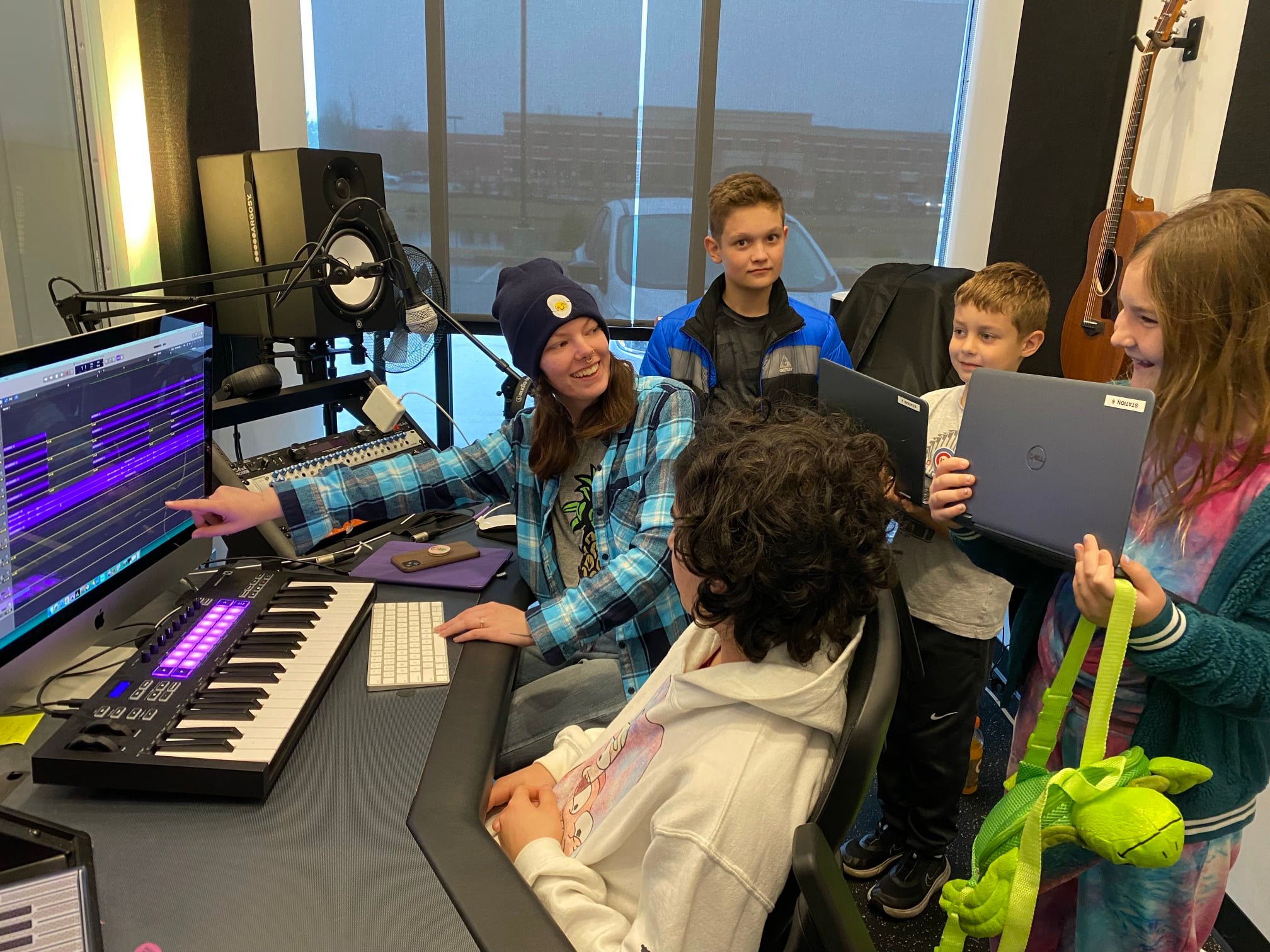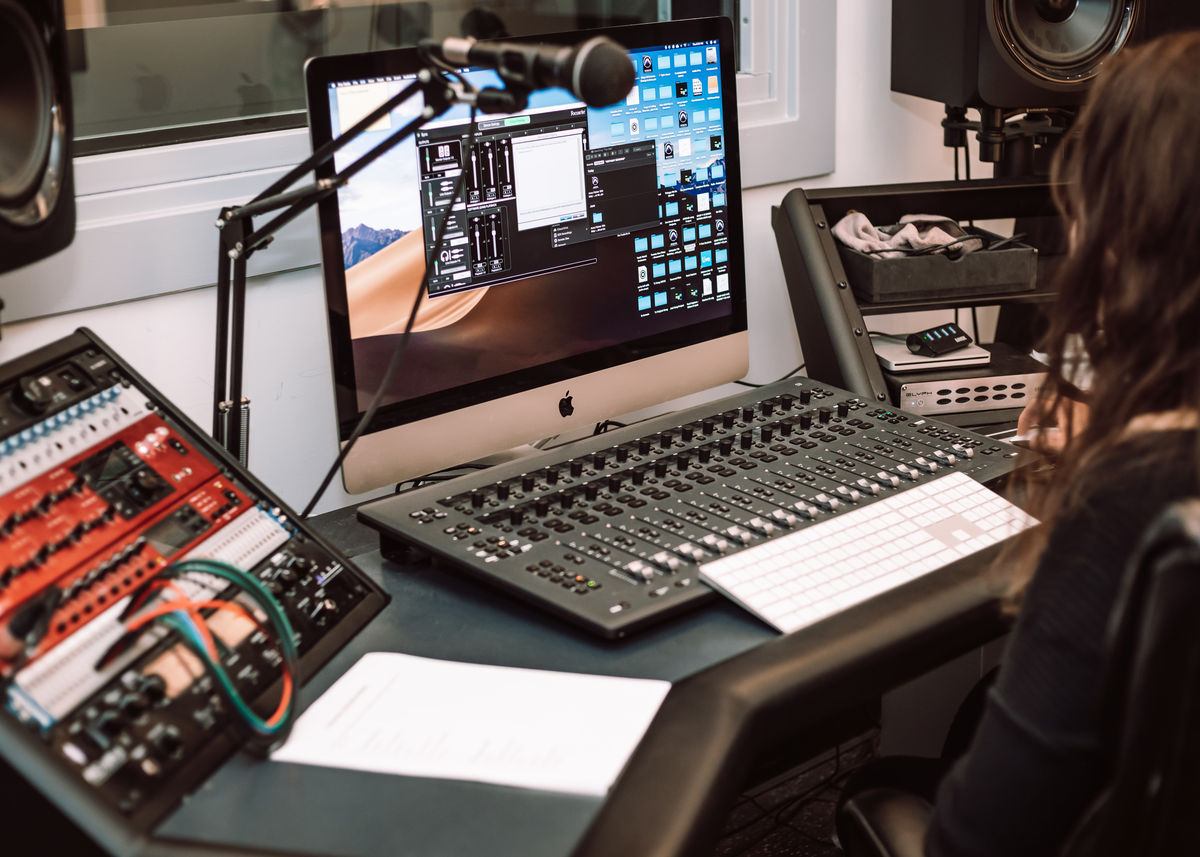Unleash Your Child’s Musical Genius: Music Production and Beat Making Classes at Bach to Rock

Picture this: your child, completely immersed in their creative process, passionately crafting the next chart-topping hit or ground-breaking beat.
As a parent, you want to provide the best opportunities for your child to explore and develop their passions. But, how do you know what they will enjoy? If creating their own music is something they’ve shown an interest in, then Beat Making (offered at all locations) or Music Production classes (offered at select locations) just might be the perfect option!
This guide will help you understand the key differences between these two fields, so you can decide which Bach to Rock class is the perfect place to allow your child to explore their musical aspirations!
What is Beat Making?
Beat making is a creative process that focuses on crafting the rhythmic foundation, or beats, of a song. This element of a song is especially important in genres like hip-hop and EDM.
Beat makers combine creativity and expertise to help set the mood of a song and drive it forward. They may use a combination of software, real instruments, virtual instruments and more to create sounds to be used in music. Often working solo, beat makers can be commissioned on a per-beat basis without collaborating with others.
What do kids learn in beat making classes?
In beat making classes, kids learn a variety of skills and techniques essential to the art of beat making. These classes are designed to cater to each student’s unique interests and abilities, ensuring a comprehensive and enjoyable learning experience. Some key areas covered in Bach to Rock’s beat making classes include:
- Digital Audio Workstations (DAWs): Students are introduced to popular Digital Audio Workstations like FL Studio and Ableton Live, which are essential tools the professionals use for beat making. They learn how to navigate and use these software programs to create, edit, and arrange their beats.
- Drum Patterns and Loops: Kids learn to develop catchy drum patterns and loops, which form the foundation of a beat. They gain an understanding of different drum elements and how to layer them effectively to create engaging and dynamic rhythms.
- Synthesizers and Virtual Instruments: Students explore various synthesizers and virtual instruments available within their DAWs, learning how to create and manipulate sounds to complement their drum patterns and enhance their beats.
- Sampling and Sound Manipulation: Kids learn the art of sampling, which involves incorporating pre-recorded sounds or snippets of music into their beats. They also learn techniques for sound manipulation, such as adjusting pitch, tempo, and applying effects to create unique sonic textures.
- Music Theory and Composition: Bach to Rock’s beat making classes introduce students to basic music theory concepts, such as tempo, time signatures, and song structure, which are vital for creating cohesive and engaging beats.
- Collaboration and Feedback: Students have the opportunity to collaborate with their peers, share their creations, and receive constructive feedback. This helps them develop their listening skills, learn from others, and refine their beat making techniques.
Related: Songwriting Checklist: 10 Essential Components to a Song
What is Music Production?
In contrast, music production (offered at select Bach to Rock locations) is a more comprehensive term that includes creating and producing various types of music, not just the beats! It is the process of creating, arranging, and refining a piece of music from start to finish.
Music production involves working with different aspects of a song. This includes songwriting, recording instruments and vocals. After that, editing and mixing the recorded sounds is required to create a professional track.
Unlike beat makers, music producers collaborate with artists and serve as musical advisors.
What do kids learn in music production classes?
Kids taking music production classes gain a thorough understanding of the music creation process. This includes songwriting, composition, recording and mixing. Classes are tailored to each student’s interests and abilities. They also provide the skills needed to excel in music production.
Some key areas covered in Bach to Rock’s music production classes include:
- Digital Audio Workstations (DAWs): Students learn to use popular Digital Audio Workstations like Logic Pro X and Garageband, which are vital tools for music production. They explore all the features of this program to create and edit their own music.
- Songwriting and Composition: Kids are introduced to songwriting techniques and concepts, including melody, harmony, and song structure. They learn how to develop their musical ideas and turn them into fully realized compositions.
- Recording Techniques: Students gain hands-on experience with recording equipment such as microphones and preamps. They also learn proper recording techniques to capture the best possible sound from instruments and vocals.
- Mixing and Mastering: Kids learn the fundamentals of mixing and mastering to create polished, professional-sounding tracks.
- Collaboration and Communication: Bach to Rock’s music production classes encourage students to work with other musicians, vocalists, and fellow producers, fostering effective communication and teamwork skills.
- Music Industry Insights: Students gain insights into the music industry, including various career opportunities, the role of music producers, and best practices for promoting and distributing their music.
Related: Why is Music Education Important?
Key Differences Between Beat Making and Music Production
From equipment and software, to the entire creative process, beat making and music production does have some similarities. Although these two fields may seem similar, there are a few key differences between them.
- Types of Music: Beat making focuses on genres that heavily rely on beats and rhythms, such as hip-hop, rap, and EDM. Music production covers a broader range of genres, from rock and pop to classical and jazz.
- Equipment: Beat makers use specialized software and hardware instruments, like drum machines, synthesizers, and DAWs such as Ableton Live or FL Studio. Music producers employ a more extensive array of equipment, including recording, mixing, and mastering tools.
- Work Process: While beat makers usually work alone, music producers collaborate with artists and offer guidance throughout the creative process.
- Complexity: Music production requires skills that differ from beat making. These include knowledge of music theory, songwriting concepts and industry experience.
Unleash the creativity
Whether your child is drawn to the rhythm-focused world of beat making or the broader, collaborative realm of music production, Bach to Rock’s classes provide a comprehensive and engaging learning experience.
As America’s largest and only Serato Certified DJ school, students receive guidance from experienced instructors, learn to use professional tools and techniques, develop their unique musical ideas, and collaborate with their peers.
Don’t miss the chance to ignite your child’s passion for music and help them unlock their creative potential. Find your closest Bach to Rock location and register for a Music Production (offered at select locations) or Beat Making (offered at all locations) class today, and watch as your child embarks on an exciting journey towards musical mastery.

